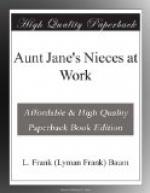CHAPTER XVIII
ELIZA PARSONS
On Sunday morning Mr. Burke again appeared at Elmhurst, and told Kenneth he wanted an interview with Eliza Parsons.
“I don’t want you to send for her, or anything like that, for it would make her suspicious,” he said. “I’d like to meet her in some way that would seem accidental, and not startle her.”
“That is rather a hard thing to arrange, Mr. Burke,” said the boy, with a smile.
“Why, I think not,” declared Louise. “It seems to me quite easy.”
“That’s the woman of it, sir,” laughed Kenneth; “if it’s a question of wits her sex has the advantage of us.”
“What do you propose, miss?” asked the detective, turning to Louise.
“I’ll have Martha send the girl into the garden to gather flowers,” she replied; “and you can wander around there and engage her in conversation.”
“Excellent!” he exclaimed. “Can this be arranged now?”
“I’ll see, sir.”
She found Martha and asked her to send Eliza Parsons for some roses and chrysanthemums, which were in a retired place shut in by evergreen hedges.
“One of the other maids will know the garden better,” suggested the housekeeper.
“But I wish Eliza to go.”
“Very well, Miss Louise.”
From an upper window the girl watched until she saw Eliza Parsons leave the house with a basket and go into the retired garden she had chosen. Then she returned to the library for Mr. Burke and led him toward the same place.
“Eliza is just beyond that gap in the hedge,” she said, and turned away.
“Wait a moment, please,” he said, detaining her. “On second thought I would like you to come with me, for your tact may be of great assistance. Have you spoken much with Eliza?”
“Not at all, I think. Beth has talked with her, but I have scarcely been near her since she came here.”
“You are willing to come?”
“I shall be glad to.”
“The poet Saxe,” said Mr. Burke, walking through the gap beside Louise, “has never been properly appreciated by his countrymen, although since his death his verses are in greater demand than while he lived. Do you care for them?”
“I don’t know Saxe very well,” she answered, observing that they were approaching a place where Eliza was bending over a rose-bush. “But one or two of his poems are so amusing that they linger in my memory.”
Eliza turned at the sound of their voices and gave them a quick glance. But the next moment she resumed her occupation of cutting roses.
“The man’s greatest fault was his habit of punning,” remarked the detective, watching the girl’s form as he drew nearer. “It is that which blinded his contemporaries to his real talents. What exquisite roses, Miss Merrick! May I ask for one for my button-hole?”
“Yes, indeed!” she replied, pausing with him just beside Eliza. “Will you cut that bud yonder, for Mr. Burke, my dear?”




